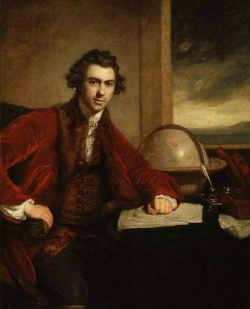Sir Joseph Banks

Sir Joseph Banks
- Born
- 25 February 1743
- Died
- 19 June 1820 (age 77)
Sir Joseph Banks was the first director of Kew Gardens and a botanist who gave his name to more than eighty species of plant. He also left a legacy of applying scientific knowledge in order to improve the world.
Banks was incredibly ambitious and tenacious and was president of the Royal Society for 42 years. To Banks, botany was an essential enterprise for ensuring the future prosperity of the nation and the British Empire.
It is fitting then, that Banks would make his name aboard the ship of Captain Cook. The Royal Navy’s HMS Endeavour housed Banks from 1768 to 1771 and here he would discover, collect and classify species of plant as yet unknown to the British Isles. During this period Banks recorded almost 800 different specimens.
Classification was perhaps the defining feature of 18th century science. Gentlemen scientists were obsessed with gathering and classifying knowledge. However, Banks was not content with the fame which greeted him after his scientific achievements aboard Cook’s ship. He wanted to use the knowledge he had gathered. He thought it was vital to establish 'a great botanical exchange house for the Empire'. Banks was made the unofficial director of Kew Gardens by George III in 1773.
The thinking was that the application of botanical knowledge would allow the most profitable crops to be grown in the most suitable environments in the colonies. The result would be to bolster the allegiance of the citizens of Britain and her colonies to an efficient and well run Empire. But for this dream to be realised an institution was needed to study and swap plants across the colonies. This was Bank’s vision for Kew Gardens.
Joseph Banks … whose revolutionary methodology modernized botany in Europe
Bank’s methods of botanical practice gained a huge amount of influence across the scientific network of the British Empire. He dogmatically made his case about the use of botany, while many institutions were being established and individuals were being trained. He was therefore able to construct an international botanical network in his own image.
Banks was a founding member of many societies that exist today, including the Linnean Society, the Royal Institution and Horticultural Society. However, his legacy was not just scientific as at the heart of his work lay a powerful idea which would gain only more currency in the centuries after his death. He argued that the application of scientific knowledge could improve the world.
This page was written by a Biology: Changing the World volunteer.



